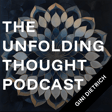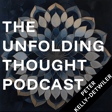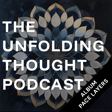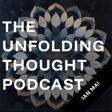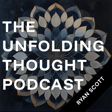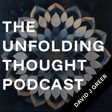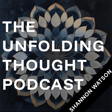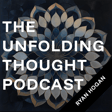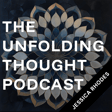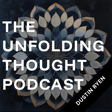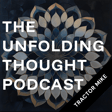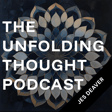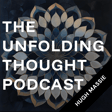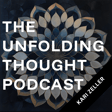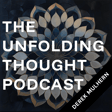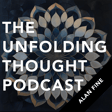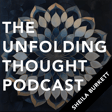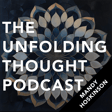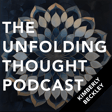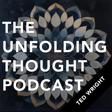Become a Creator today!Start creating today - Share your story with the world!
Start for free
00:00:00
00:00:01

22–Lucas Mack – Every man dies, but not every man really lives
In this episode of The Unfolding Thought Podcast, host Eric Pratum welcomes Lucas Mack—former morning TV reporter, creative agency founder, and head of brand for Kubota. Through personal stories of adversity and triumph, Lucas explains how telling the truth—both to yourself and to others—can become a powerful catalyst for transformation in business and life.
Topics Explored:
- Resilience Rooted in Hardship - Lucas shares how surviving a difficult childhood taught him not only grit but also the importance of authenticity.
- Finding the Real Story - From local news segments to advertising campaigns, Lucas shows how a deep dive into human motivations and emotions uncovers the hidden spark that inspires customers, employees, and entire organizations.
- Leading With Courage - Why surrounding yourself with humble yet bold people elevates team performance—and what it looks like to call out executive assumptions.
- Building a Next-Level Brand - Beyond “being number one in your category,” Lucas argues for building a brand that stands for something big—so big that profit becomes the byproduct, not the prime product.
- Truth as Freedom - Whether it’s refusing to settle for surface-level answers or owning your own story, Lucas reveals why naming the truth is the only way to break free from cultural constraints and unlock genuine innovation.
If you’re curious how bold honesty, personal resilience, and a well-defined ‘why’ can turn a brand—or any team—into a lasting success, Lucas’s insights will help you bring deeper authenticity to your own work.
Links:
- Lucas Mack’s website: https://lucasmack.com
- Connect with Lucas on LinkedIn: https://www.linkedin.com/in/lucasmack/
- Lucas Mack’s book: https://www.lucasmack.com/ebooks/everyone-has-a-plan-until-they-get-punched-in-the-face-by-lucas-mack
- Lucas’s TEDx talk (2019): https://www.lucasmack.com/lucas-mack-speaking
- Lucas Mack’s podcast: https://www.lucasmack.com/the-lucas-mack-show
- Mrs’ Baird’s bread: https://www.mrsbairds.com/products
- Joseph Campbell’s The Hero with a Thousand Faces: https://amzn.to/43NjVcV
- The Truman Show (film reference): https://www.imdb.com/title/tt0120382
For more episodes, visit: https://unfoldingthought.com
Join the conversation by emailing Eric at: eric@inboundandagile.com
Transcript
Introduction to the Unfolding Thought Podcast
00:00:04
Speaker
Hi, I'm Eric Pratom. Welcome to the Unfolding Thought Podcast, the show for leaders and deep thinkers who demand more than the usual fluff.
00:00:16
Speaker
If you're the kind of person who moves on from a book, video, or podcast the moment it stops making you think or introducing you to something you can use, I hope you'll feel right at home here.
00:00:30
Speaker
In each episode, we uncover the deeper, often overlooked forces that shape our thoughts and behaviors so you can see yourself, your team, and the world from a whole new angle.
00:00:44
Speaker
and then actually apply what you learn to grow and do better. On the Unfolding Thought Podcast, we aim for minimal filler and maximal insight, challenging assumptions and sparking new thinking every step of the way.
00:01:01
Speaker
Are you ready to dive deeper? Then let's get started.
Lucas Mack's Career Journey
00:01:07
Speaker
Today, I'm speaking with Lucas Mack, a former TV reporter turned branding strategist, who's powered by one core obsession, finding and telling the truth behind every story.
00:01:20
Speaker
From being a one-man show in news segments at dawn to building his own creative agency, and now leading branding transformation at Kubota. Lucas has made a career out of uncovering what truly matters.
00:01:33
Speaker
and inspiring others to do the same. In our conversation, he shares how tough childhood circumstances taught him resilience, why discovering a brand steeper why is non-negotiable, and how speaking uncomfortable truths can unlock genuine freedom, both for leaders and the teams they guide.
00:01:56
Speaker
If you've ever wondered how digging deep can spark growth, you'll get a wealth of insight here. And now I bring you Lucas Mack. Lucas, thank you for joining me. Would you mind telling me a little bit about your background?
00:02:11
Speaker
Absolutely. First of all, it's a pleasure joining you, Eric. And you know my background is, people tell me, and I think I tend to agree, it's just very unique. I always share how I got to where I am It's been a varied background. So I'll just say that Kind of the big thread for me growing up, I was a musician at a very young age, wrote my very first song at seven years old, which I can still play today.
00:02:36
Speaker
And i've been writing music ever since. So always creative and in, in art music. And the first job out of college was audience coordinator to a live local talk show. And so I had seen this role. I'd gone to the tonight show a couple times and and was really impressed with the guy that started the show before the show started with Jay Leno coming out.
00:02:58
Speaker
And unbeknownst to me, that role is called an audience coordinator. So there was a live local talk show in Seattle that i was looking for an audience coordinator. And I applied and hundreds of people applied for this role.
00:03:11
Speaker
The very rare, you know, you can imagine there's not that many TV shows out there and there's not that many people who are audience coordinators get the opportunity to get these gigs. Well, I had called the Tonight Show dirt while I was interviewing for the role and I got through to a guy's name, Scott. I can't remember his last name.
00:03:27
Speaker
And he talked to me, gave me some tips. It was fantastic. And so I used what he he gave me in the interview and And i got to got the job and
Education and Transition into Branding
00:03:36
Speaker
it was great. I learned a lot. And that show was really the feeder show for producers to Harpo and Oprah's show. So Oprah's executive producer, all the main producer cast on that show came from the TV show that I worked on. So I had a tremendous education in storytelling, live TV production, entertainment.
00:03:57
Speaker
And it was a great, great job. From there though, and my my desire of always being a storyteller and journalist took an on-air broadcast reporting job in a small market in state of Washington, Market 126. And I was the morning reporter, morning feature reporter.
00:04:15
Speaker
Which I share the story part of it. I was the one man band live morning reporter, which meant that I'd get to the station at three 30 in the morning, go out to the story, get on top of a Chevy Astro band that had plywood on top of it.
00:04:31
Speaker
put a little satellite dish and try to find the towers, even amongst fog or rain, call the station A's the signal. Good. Yeah, it's good. Okay. Then I had to run sometimes a hundred to 200 yards of cable to my camera where I was the reporter, the videographer, the photo, the producer of this segment.
00:04:53
Speaker
So it was quite an education, but I did that. And then I took a job down San Antonio as a future reporter. Fox affiliate came back to the ABC affiliate in Seattle as a general assignment reporter. And that's when I had this idea to start an advertising agency and really creative and advertising agency hybrid.
00:05:11
Speaker
When I was at the TV station, I would tell these stories of companies and they would do really well after I told the stories. And I shared the story the other day with someone asked how I got to where am.
00:05:23
Speaker
He said, I told the story about Mrs. Baird's bread factory. Mrs. Baird sells bread all throughout the Midwest in the United States. And I'd get pitched by the PR agencies. had a segment every single night with my name in between weather and sports down in San Antonio. So people would watch. I had kind of a following.
00:05:40
Speaker
And this PR agency said, you got to see how these twisted loaves of bread are made. I'm like, come on. Fuck. Again, this can't just do straight commercial for business. And they're like, no, it's really cool.
00:05:52
Speaker
People actually are making these not done by machine. And I was like, all right, so we'll go check it out. And it was the first time I had ever been inside a nondescript warehouse building. You know, like every building we drive by on the roads or freeways, like and never give two thoughts about what's going on inside of them. And this building was the same. It just said Mrs. Barrett's on the outside. But I walk in and was immersed in this like I'll never forget it. It smelled like honey. It was warm. It was incredible. they had cooling racks, a loaf of bread running above my head, and it was on a lunch shift.
00:06:25
Speaker
So there was no one working except these two women that were part of the story that they want to interview. There was this conveyor belt and on the conveyor belt was dough coming down and two and a woman on each side of conveyor belt speaking Spanish.
00:06:39
Speaker
And they would flip it look like challah bread, which challah is three strained loaf. This was a two strained loaf, but it was it looked like knotted like that.
00:06:51
Speaker
So they tried to teach me how to do it. I couldn't do it And I thought that was kind of the story. Like, no, this is funny. And I couldn't make it. and And I really thought, you know, usually that was kind of the depth of the story. If I could make it funny or kind of interesting, me experiencing something.
00:07:05
Speaker
But one thing I learned early on ah in reporting is i would always turn around after someone gave me the story. As I was walking away, they thought I wouldn't turn around. So I turned around.
00:07:17
Speaker
and that's when i I find you really get the truth. Like people can say one thing, you walk away. They don't think you're looking. And then I turned around and and what I saw was as we were leaving with the general manager, agency, my videographer, the women had stopped the conveyor belt.
00:07:34
Speaker
They didn't know we were watching. We were probably 75 yards away in this million square foot production facility. This thing was huge. They had found the pieces of dough that I had messed up. I did not make one good one.
00:07:47
Speaker
They stopped it, grabbed the dough, fixed it, and then hit the conveyor belt and started working again. And no one knew that they were doing that. No one saw it. The general manager, I was the only one that saw that.
00:07:59
Speaker
and i And immediately I said, that's the story. I mean, these women are probably getting paid minimum wage. They'd never spoke English to me. They just spoke Spanish. But that later in that night, I told the story of all the data, a million square foot of warehouse space, all the employees, how much money they spend in advertising, all their budgets and all the data.
00:08:18
Speaker
I said, but it's the specialty in touch in every loaf of bread that makes Mrs. Beard's twisted loafs of bread or whatever they were called. special. And I ended up telling the story about those two women. And couple days later, the PR agencies, is like they sold out in all the San Antonio market and H-E-Bs and was like, no way.
00:08:36
Speaker
And true enough, I went and checked and that became a little follow-up story. it was kind of fun. People really love that story. So I had seen the impact of an effective story on a business.
Running and Selling a Successful Agency
00:08:47
Speaker
And so when I left the ABC affiliate in Seattle,
00:08:50
Speaker
And this idea that I can tell company stories, place their advertisement and produce all their creative and their branding. It took off. We were really successful. And I built this. It was challenging to build, but I built this successful branding and creative agency over 11 years. And Learned a lot.
00:09:09
Speaker
I wrote a book that got published in 2013 titled, Everyone Has a Plan So They Get Punched in the Face. The old Mike Tyson quote, chronicling what I learned from starting my business and all the pitfalls and ups and downs. And I didn't get my MBA through a traditional sense. I got my MBA through Starting actually a business and learning, learning hands-on.
00:09:30
Speaker
But from there, eventually sold part of it off and went to a management consulting firm that was trying to stand up a marketing practice within the firm.
00:09:42
Speaker
Because at the time, like Deloitte Digital was getting stood up, Accenture Interactive, like a lot of the big four were buying a lot of creative agencies. And it's a really smart model because the management consulting firms are already within the walls of these big enterprise companies. And so it's an easier pitch if they can develop the strategy and the creative.
00:10:01
Speaker
So the consulting firm that I went to work with wanted to stand it up. And and I did. And it stood up, had some really nice success, stood up a creative services practice and ran that. for a while. And then once I was ready to leave tech, because for many reasons, but I was ready, i ended up taking the head of brand position at Kubota, which lot of people associate with tractors and excavators, construction equipment, RTDs, mowers.
00:10:28
Speaker
which it does those things incredibly well. And also it does many other things in the world. And so I've been there a little over a year and it's been a great, a great journey and, and, and really fun.
00:10:41
Speaker
And we're about to build this brand out to be one of the most important brands in the world. And that's what I'm most excited about. So that is a long kind of chronological ordered story there, but gives context of where I've come from and how I got where I am.
00:10:56
Speaker
It seems like there's a combination of being willing to figure a lot of things out and or take responsibility.
00:11:08
Speaker
for handling a lot of things going on at the same time. So for example, being an audience coordinator, there's a lot that you have to be sensitive to the people that are running the show, to the talent, to the audience, to whatever else might be going on if you have to move things along more quickly.
00:11:32
Speaker
And then you go to having to set up the satellite dish, set up the camera and any number of other things. And whether you love all of those things or love the pressure or not to have those things occur, to be have that be part of your life and then to build your own business and to set up a new practice within another business.
00:12:00
Speaker
And now it sounds like with Kubota, the work you're doing that there are likely a lot of spinning plates, you know, or a lot of balls in the air. It seems like that must be a part of your nature.
00:12:14
Speaker
And you said one thing when you were looking to get this show that get that role on this show. you called sort of a key resource or the expert.
00:12:28
Speaker
And I think you said it wasn't like you knew this gentleman or anything, but for one reason or another, you did something that a lot of people might feel it put too much pressure on themselves or they were too shy or afraid.
00:12:46
Speaker
And maybe these things don't relate, but I'm curious maybe how you see yourself and do you, have you recognized in yourself that, yeah, you, you can handle a lot of things going on or you are a risk taker or is there something about you that you think ties some of these actions and then your, your journey together?
The Role of Resilience and Truth in Storytelling
00:13:12
Speaker
I laugh because, you know, I think I have taken a lot of risks. One thing about that, that role in particular, you know, it's very rare that we get feedback.
00:13:23
Speaker
You know, i mean, sometimes, you know, if it's too late and get feedback on job, people get terminated get on a performance plan, which thankfully experience, but yeah it's just rare to get feedback from people.
00:13:36
Speaker
Well, when I interviewed for that job, The final interview was with the executive producer and host of the show. And yeah, the executive producer and the host of the show. And they were sitting on the stage and one is this empty TV studio with like, don't know, 60, 70 chairs in the studio audience. No one's in there except me and them.
00:13:56
Speaker
And the the final interview was I had to put on a performance and entertain them as if I was doing it live in front of people.
00:14:07
Speaker
And so I had bought, I had bought, swung by and bought candy bars at a convenience store and all these things in my pocket. And I turned around and faced an empty audience. And I was like, all right, I'm going to give you some prizes today. Anyone?
00:14:23
Speaker
Here's an easy one. Can you tell me what day of the week it is? And and to help me forget this, I'm like, no, sir, it is not Monday. Anyone else? and And yes, sir, it is Friday. And I tossed these candy bars up into an empty stage. You you hear it hit.
00:14:37
Speaker
You could hear it go. Where? And I do this for a little bit. I ended up getting the job and they told me 400 people applied for this position. They brought in 12 people from New York, people from, and I was, i still had two classes to finish at college. So I hadn't even graduated college yet.
00:14:57
Speaker
And i had an internship at the NBC affiliate lined up for the sports department. I thought I was going to go into sports, but i I saw this job and I really wanted it. So anyway, they gave me feedback that out of all the applicants that they brought in, the finalists, I was the only person to face the audience and put my back to the host and executive producer who were sitting on the actual show stage.
00:15:19
Speaker
And I actually performed as if no one was there. And they said everyone else performed to them. I thought, that's so... Interesting that I've always been a little different. I don't know if that was a stage role or, you know, it definitely wasn't calculated and strategic. I just thought they wanted to see how I'd do as if I was actually doing it. And don't know, I think about that.
00:15:41
Speaker
and know, that will pop up once in a while because like I sometimes do get feedback and people will say like most recently, the president of the company who I report to said in all his years, he's never had someone do what I did.
00:15:54
Speaker
and I laughed really hard. like, that is so funny. But that's also who I am. You know, I have learned a lot about myself. I grew up in a really abusive situation. I was abused severely.
00:16:05
Speaker
And i think that taught me resilience because every single day, no matter what happened at night, the night before, no matter what I was experiencing, no matter what, I had to get back up, go back out and do it again and again and again.
00:16:22
Speaker
it became less so about caring what other people think and more so about how I can show up despite what they think. and and And it was a it's a what I mean by that. and Here's another piece of feedback. And this is...
00:16:38
Speaker
get maybe in a sensitive area. But during 2021 living in Seattle, I had a hard time masking because when I say at our time, refuse to in a, seat in a city, in an an area that was like anathema to not put a mask on. You were like, I was told even in my podcast that I host that I'm killing grandmothers and I got a lot of really horrible, mean and, and horrific things said to me.
00:17:04
Speaker
But what it felt like to me is I was getting abused again. I committed a long time ago when I was a little boy, I'll never do something against my will ever again. But I learned something and going to tie this to a lesson that I learned that's a deep inside. And I hope this is a deep inside for everyone, regardless of what side of any issue that you, you fall on. Cause this was insightful for me.
00:17:26
Speaker
had a Navy SEAL buddy. I was officiating the wedding in Seattle and And a Navy SEAL buddy was a groomsman and I was the officiant to ah a really good friend of ours. And he wasn't wearing a mask and I wasn't wearing a mask. Everyone else was masked. And we walk into like the heart of Seattle and my Navy SEAL buddy, scary looking guy, looks like GI Joe.
00:17:45
Speaker
No one talked to him. He walked right through, but they thought me, I'm sure you got to wear a mask. And I got really frustrated and got hangry. And my Navy SEAL buddy asked me later, he's like, why you get so angry? And I explained, you know, I was fired up. I was like, you know, every time it feels like I'm getting abused again.
00:18:02
Speaker
And he said, you know, you re-victimize yourself every single time you bring that energy to that engagement and you make them the perpetrator again. And I, it was like this light bulb went off and God, that's such an important thing. I'm bringing this energy, projecting it out and I'm getting the response, expecting what I, you know, what have always gotten, which is someone try to force their will onto me.
00:18:26
Speaker
But I realized later that evening, as I was reflecting on that comment with my buddy, that I am also the perpetrator and other people's story and that most people are conditioned that if they don't do the right thing, they will not get rewarded or they will get punished. And so but we're two different human beings, you know, two different perspectives trying to do the right thing for ourselves.
00:18:50
Speaker
And it's really like a trauma response that ah both sides have. My trauma response was no anyone. is the last breath and their trauma responses do it or we're going to get trouble or we're not going to get rewarded or we won't be part of the group.
00:19:07
Speaker
And that helped me have so much compassion for people. And really that charge and that fight that it had, subsided um since then. I share all that to give context of, I think just the circumstance of how I grew up helped me see things a little differently.
00:19:23
Speaker
And then resilience to not worry about what other people think so much is like, I had to do it for myself. So somehow it does fit into like what I do every day and what I've done throughout my career.
00:19:37
Speaker
I think you being a reporter and perhaps having this, this thing in you, this drive to look for the truth, you know, to look for what was meaningful in, think it was Mrs. Baird's, right?
00:19:51
Speaker
And I realized that that's not necessarily a big thing in that particular story, but it sounds like it when people care enough to not just let a problem slide by that drive that you have.
00:20:04
Speaker
to look for what could have an impact here then lends itself well to going into starting the kind of business that you started. And then I think I heard you say, once you moved on from there and you were standing up the marketing and creative practice,
00:20:26
Speaker
that going to focusing on creative in particular, you must have a great drive to find in design or in the stories that you might tell, what is it that isn't just going to be shiny or surface level and now i suspect that in you know you only talked about it a little bit but i suspect with what you said about taking your current brand or taking the kubota brand to being i'm forgetting your language but it was something like being one of the biggest brands in the world that that's part of what you're looking for is what's the truth behind this story or this brand does that sound correct
00:21:14
Speaker
ah yeah Absolutely.
Building Authentic Brands through Core Truths
00:21:15
Speaker
This good. That's good insight into what I just shared. you know, I share, I give a Ted talk 2019 and say in my Ted talk that the two words that I described my life growing up was fear and confusion.
00:21:32
Speaker
I was so afraid, constantly afraid, constantly. I would get frustrated. I mean, in, in every category it was, I had, I suffered abuse and I was a really, really a freak. I was a scared up until 2018 when I went to this emotional intelligence training,
00:21:53
Speaker
But I was like a little boy in a ah man's body. I was still a scared little boy. And needing to find the truth is what kept me safe because I was so gaslit in a family of just absolute insanity.
00:22:08
Speaker
But also, was raised a liar. And and everything was so shadowy and slippery. And so when you say truth, like, yes, the truth, you know, it's interesting, like in a religious sense, like Jesus says, you shall know the truth and the truth shall make you free.
00:22:27
Speaker
And that's, I would say a big T truth. But what I've also learned in my own experience is that the little T truths, the particular truths to tell, have the courage to tell one story or have the courage to uncover someone else's story.
00:22:42
Speaker
The little t truth is just as impactful because truth is the only thing that truly does make us free. And in order for a brand to be free, in order for ah campaign to be free, in order for you can apply ah principle of freedom to literally anything and everything that we do,
00:23:02
Speaker
truth must be applied in order for there be to be freedom in whatever we do. So I do, and I even ask, I have a very specific methodology when I build brands and I ask every single person, I've been doing this for 15 years, what would you crawl bloody knuckled over a broken field of glass to accomplish?
00:23:19
Speaker
Come and go. I mean, it's pretty funny the responses I get because people think, oh, brand guy, and I'm usually like happy and go lucky. And all of a sudden I I, I stopped the surface level and I go really deep and then I will swear usually to disrupt their mindset to give me the answer they've always given every single person. And that's,
00:23:39
Speaker
That doesn't inspire anyone. So we go really deep and we get to a core truth. I've had executives cry in these sessions. I've had executive one executive at a company up in Seattle want to fight me.
00:23:51
Speaker
That was bizarre. But that's how real of an experience to ask someone. And then, and I told, I told, I told the president when I was there, I said, I'm going to push back on you. Okay.
00:24:05
Speaker
And I don't, I think sometimes people don't know what to do with that. And it's not as an obstinate, arrogant or egocentric thing. It's because I care about the truth and the truth is what inspires people. When you know the truth, there's this, when you can unlock that truth, being in a brand, being into yourself, you can breathe more
Truth and Inspiration in Brand Building
00:24:27
Speaker
deeply.
00:24:27
Speaker
And breath is how our soul is expressed. In Hebrew, the word for soul is neshama. And neshama also means breath. And so the deeper we can breathe, the more we can expand ourselves and our presence. And so that's how I look at it is always trying to find the truth.
00:24:48
Speaker
so that people can be inspired. And I write my book, inspired people, inspire people, but conversely as well, that is true as well. Uninspired people, uninspired people, uninspired brands, uninspired employees, uninspired, you know, the wet wood, you don't get fire from wet wood.
00:25:04
Speaker
And so it's interesting you saying the truth. There's core foundational truths that at the end of the day, I think we're either inspired by or we're stuck in a system that doesn't lead to our freedom, doesn't lead to inspiration, doesn't lead to exciting brands. And I think that's why it's hard for big brands to become, you know, the era of the eighties and the seventies, you know, even the late nineties, you still have this era of ah Steve jobs.
00:25:33
Speaker
Steve jobs is building a brand. He wasn't building a technology company. Howard Schultz was building a brand. He wasn't building a coffee company. Phil Knight was building a brand. He wasn't building a shoe company. like These guys believed in something so deeply that everything else was anathema to that true experience that they were trying to bring into the world.
00:25:53
Speaker
And that can be offensive. The truth offends and it also provokes, but the truth is akin to brand. A brand is an idea in someone's mind before you ever experience the product or experience the company or experience the person. And in that regard, we don't have a lot of brands in the world. We have very few brands, but there's lots of companies with names and there's lots of products that are sold.
00:26:18
Speaker
And I think there's a lot of people that should be their own brand, but they're afraid, I think, to step apart from the crowd and they suffer this us-two mindset. And I think part of my journey has been being a leader to hopefully inspire other leaders to say, it's okay, you can step out too.
00:26:37
Speaker
The process that I have is this formula that I developed and I wrote about it in the book, which is that I believe or company believes. So you do this for yourself. I've done many personal, your corporate world, I'd call brand story in the personal development world. And I coached a lot of individuals and leaders. I call it your personal mission statement, but it's basically I and or company believes.
00:27:01
Speaker
Only when variable A can variable B, which variable C. So the B variable is where I always start. And that's when I ask them, what would you crawl bloody knuckled over a broken fill of glass to accomplish? and And there's a process and we go through and something it's usually the first thing they say is surfacy. And, you know, a lot of executives have said to make money or the company's profitable. I'm like, so okay, okay.
00:27:26
Speaker
That's not really, there's got to be something deeper to that. Like, and and I'll push on them. But once we establish that B and it feels close enough where I feel like they're finally giving me their instinctual truth and not filtering it through what they think they should say.
00:27:41
Speaker
Then I jump up to the A variable and say, okay, this is what you're sending out to the combo. What's the only way, the only way you believe that can happen. Not, I believe in I believe only when, and that is like, and I use, I use movies quite a bit because they're, they're good visual representation of, of truth. They, you know, these Hollywood writers, they, they take deep,
00:28:06
Speaker
human truths. And then they put it on screen and we all resonate with them in Braveheart. You have, you have all these highland farmers and with pitchforks and whatever weaponry they can use with the Scottish Lords and the nobles.
00:28:20
Speaker
And they're standing there against the most powerful army in the world. And, you know, the nobles are going to negotiate for more land and title. And and there's that line where the guy goes, we didn't come here so that they could get more land, get more titles.
00:28:35
Speaker
And then this narrative gets interjected through the former William Wallace in the movie. And he starts to ask them why asked him very, and and it's so hard for you to love that movie from a brand perspective. It is what brand and it's in what truth does.
00:28:48
Speaker
And he asked them why. And at the end of the year days, would you rather like all men dive and all, not all men truly live. Like, That is a truth. Not all men truly live. And at the end of your life, when you look back, what would you say? Would you be willing to get...
00:29:05
Speaker
just a moment for your own freedom. He asked them this question. So through the transformation of the movie and this great purpose that he has in this inner calling and and he wants justice for the the death of his wife and all these things, but he brings these truths that he learned through the classical education that his uncle took him down to Rome and taught him Latin and taught him all the classics. And he was classically educated so that he was a philosopher bringing the philosophical truth. He brought a universal truth back into the particulars of relativism and inspired the same people to beat the most powerful army in the world.
00:29:41
Speaker
It, they weren't trained that much different. They still have the same weapons in the movie. You know, they're still highland farmers, but with the truth, with it saying, i believe only when something can happen, can I go out and accomplish this one thing that breeds inspiration into every person that hears it. and that's the point of companies and, and brands, know,
00:30:02
Speaker
But that's the process. And yes, there's five questions to make a story. We're taught this is the as we're very young. Who, what, when, where, why? Who, what, when, where engaged the mind? They're fact and figure-based questions.
00:30:14
Speaker
And companies, for the most part, are pretty good. And I would say people, for the most part, are pretty good at talking about who, what, when, where. In fact, the second question we ask each other when we meet in in social settings after we exchange names is, you know, what do you do? But ultimately, I don't think people care what someone does. I think we're trying to find out, do I know this person? and Do I like this person? Can i trust this person? Is there something compelling? Can I align with a common belief with this person? But that's how we've been conditioned to find that out.
00:30:44
Speaker
But the one question that people struggle about asking and answering is why. And the reason why I've assessed that people struggled, why companies struggle, why and why, why it's so impactful is it's the only question that evokes emotion and why is akin to what we believe in.
00:31:04
Speaker
And when you live in a relativistic postmodern world that don't talk about what you believe in, because what you believe in might differ from the collective and the collective is lockstep in some ideology, wear a mask. And the one guy is like, I'm not going to wear a mask. and no you The collector turns on the one answering the question. Why helps you stand in spite of all that and to navigate around all of that and to be different.
00:31:31
Speaker
than all that. And so it has been a custom not to talk about our why, because it's not comfortable talking about what you believe in, you know, the three things don't talk about money, politics, or religion, but that's the core identity of every individual.
00:31:43
Speaker
They call it the silent majority for a reason because people, although the majority don't feel comfortable talking about these deep seated beliefs. However, Without the why, there's no inspiration.
00:31:56
Speaker
You can't logic. We cannot, and we've tried, I think for a long time, logic our way into inspiration. We cannot just answer questions to the mind and then inspire movements or inspire ourselves or to to ignite something within us.
00:32:12
Speaker
We have to go deeper and we have to be willing to face the truth. And the truth sometimes not pretty. The truth sometimes is ugly. believe The truth for me and my own personal journey and my own story is I had to go back and look at all the abuse that I endured and not like skirt away or have a memory I used to. It was locked away and I just never looked at it. I never, ah never would look at it into the, ah in the eye and I never i would just kind of gloss over it, but it affected me so greatly until found the courage to look at it myself and to look at every event and everything and
00:32:44
Speaker
no longer shy away from it. Well, that led to my own personal transformation, like a born again experience in and encourage every person to
Emotional Connection in Leadership and Branding
00:32:53
Speaker
do this today. But how often do we do that? And just simple things like a company, like, why do you do what you do? I always tell executives, if you're not inspired by what you're saying, who you think is going inspired?
00:33:02
Speaker
Like if that, if you're not lit up, no offense to anyone out there, but if you're not lit up by what you're telling people, you either think people are really dumb or people are just going to obediently do what you tell them to do. And I find that most cases are neither are true.
00:33:18
Speaker
People are not dumb. People are very smart. And majority of people will not take action unless they feel inspired to. And I, and I do share with executives and it's the same across the world. Every human being buys emotionally and they back it up logically.
00:33:34
Speaker
And so I am usually surrounded as a, as a brand marketer and, and, no yeah I'm a businessman with a creative, i would say, bent to me primarily over data. and But I tell all all these executives, usually I want data, data, data, data. I jokingly say, raise your hand if you're married. And all these executives raise your hand.
00:33:55
Speaker
Say, which one of you had your spouse fill a spreadsheet before you decided to fall in love? And they all got to laugh because of course it's ridiculous. You fell in love first and then you had to think through our, you know, how can we do this? Is it, is it possible?
00:34:10
Speaker
That's the same in every decision when people go down the grocery aisle, buy a car, which gas station to go to. Like literally everything's an emotional decision that people back up logically. And answering the question why is what ties to that emotion.
00:34:26
Speaker
And so just finishing the answer your question is I'm not afraid and helping executives or helping people go into those places are typically don't feel comfortable talking about the emotional stuff. But until we do, know there's no way we can have the complete story.
00:34:45
Speaker
You know, whether we're talking about building your own business or advising your clients, how have you gone about gathering people around you that share similar values and, you know, aren't just inspired by that statement that you make?
00:35:07
Speaker
Well, in the book that I wrote, i talk about, i knew my why early on and knew my what, I knew my when, where, but I actually didn't know who. And The who was the character traits of those that so that you surround yourself with. And I just thought, you know, young entrepreneurs, 26, 27, start now. We're in the fastest growing companies in the state of Washington. I was hustling.
00:35:35
Speaker
I thought, well, just get the most talented people I can find. And I've had the most talented people. You know, I didn't even qualify like morality. It was just talent.
00:35:46
Speaker
And i Had an employee that was one of the most talentedly creative people I've ever met, but culturally was one of the worst people I've ever encountered and started a coup at the business and was horrific and very painful. and And once I terminated that employee and i had the I had one of our biggest clients say, if you want but if you hadn't fired that employee, we were going to terminate your agency the following week.
00:36:15
Speaker
because we thought they were a reflection of you. And I was like, dang, I mean, it just showed me that more people are watching, you know, I'm saying one thing, but then these employees are doing another thing. So I had to really learn about culture and how to lead culturally and like with culture,
00:36:31
Speaker
a more important than strategy.
Team Building and Cultural Fit in Branding
00:36:32
Speaker
And so I have, and I like this term, like attracts like, think I was, I was overly ambitious and insecure and I hadn't dealt with my own personal trauma and stuff in life.
00:36:45
Speaker
So I was, you know, that little scared boy in a man's body. and And now that I'm embodied and And I'm in who I am and I know who I am and I'm happy to talk about anything, anytime, anywhere with anyone. And I don't feel insecurities anymore. And I just have done a lot of interpersonal work and healing. Now I look at how can I bring in people with humility And but and courage. Those are the two things that i I look for now and the people that I surround myself with. It takes a lot of courage. I told the head of engineering for Microsoft Teams in 2019, we rebranded t Microsoft Teams.
00:37:25
Speaker
So with all due respect, no one talks like that. It's like the oxygen in the other room. People were like, whoa, my knock. You can't talk to her like that. and i And I did it with respect, but I also you know took a lot of courage. I mean, they could have fired and they could have canceled our you know the the firm's contract.
00:37:43
Speaker
But it was the right thing to do. And I was right. knew it was right. And I ended up going with what I suggested and in a And I shared with her, no one talks like that. It doesn't matter the message conveyed, matters the message received. And so we have to think through the customer lens, not the corporate lens.
00:37:59
Speaker
So now building teams and this like attracts like concept is, for me, it's just, are they cultural fit? There's a lot of talented people, but I want to be surrounded with humble yet courageous people that are excellent. In my book, I talk about the 1090 philosophy, which is this philosophy or theory that I developed that hypothetically 10% of the world's population are doctors.
00:38:24
Speaker
The 90 goes to the 10, tell us the 10 what's wrong. The 10 writes something on a piece of paper, gives it to the 90 and the 90 swallows what's ever on that piece of paper. They don't ask, where is manufactured? Why is it colored the way it is? Where are the side effects? you know For the most part, the 10 tells the 90 to do it, and the 90 doesn't.
00:38:41
Speaker
What I realized in in teams, although it's good to be a generalist and in classical liberal arts education and to know many things and to be wise, at the end of the day, I want to be surrounded by nine other ten And that's how I feel the best hole is made is when you have people that are experts in their own disciplines and that everyone can stay in their own lane and respect one another as the peer that they are to bring that with humility and with the courage to do you know what's right.
00:39:11
Speaker
That's how I build teams now. I referenced this. like I spoke in Nashville to these parents for this project, that this farm school project that we're producing a series on. I shared with them, I said, you know, I read a book to my children around the holidays every year and it says it only takes a few who know what's right and do it too.
00:39:30
Speaker
I love that. And I, and my Navy SEAL buddy, and I look at how the military, he, I forget the monetary number. I think $8 million dollars is what the military values each Navy SEAL as if they were a piece of equipment, the training and the tool, all the things they use.
00:39:46
Speaker
But there's only 12 of them in a team that will go out. And my buddy would say that 12 SEALs, 30 Marines, 300 soldiers or something like that. And there's some equation that they know different purposes, different tools, different.
00:40:01
Speaker
But I like to build teams like the Navy SEALs. Like they're all, my buddy was a linguist, a bomb technician, a sniper. He could do many things and he was expert in those things. But he also knew that his other buddy was expert in the things that, you know, the guy next to him. So yeah.
00:40:16
Speaker
so i look at teams now. And it's been interesting. I'm still learning. mean, we're all learning, but I'm still in pursuit of finding a figure. I look at life as there's some equation. everything's ah Everything's an output of a process. And if I don't like the output, then I have to go change the variable. So most often, I'm usually thinking about how to tweak the variable and what's the input to get the the right output that I want.
00:40:39
Speaker
But right now, i think it's been a pretty effective on getting humble yet courageously talented people surrounding me.
Conclusion and Listener Engagement
00:40:48
Speaker
I know we're on a schedule today. So as we wrap up, whether it's your work today or anything else, are there things that you feel like are important to share before we wrap up or places that people can go to find you to connect with you or anything else?
00:41:06
Speaker
Well, first of all, I just appreciate you and how you think and see the world and situations and how you're able to decipher these truths. You know, you've asked me about truth, but you you pulled out many.
00:41:19
Speaker
I did this video about the Truman Show. A couple years ago and the true meaning behind the true man show. And I see, and I broke down what this movie was actually telling us in a way you could look at it as like, some people think that they were mocking us, but I look at it more as the awakening of,
00:41:41
Speaker
that can happen within each of us, that what happens to the true man, the true human has lived this veneer of doing the right thing and everything seems so good and and easy and life just kind of happens at this surface level until you start asking questions and you start really wanting more.
00:42:04
Speaker
And in the true man show, he always wanted more. He wanted to go on these vacations. And then everyone gave him all these different calculated reasons why he couldn't or, oh it's dangerous. Or there's always this...
00:42:17
Speaker
dismissing this inner calling that was deep within him until one day he goes and finds the courage to go pursue that which is inner calling inside him regardless of the consequence and so he gets in that boat and he just goes he knows he doesn't even know where he's going but he goes and Ed Harris, the creator of the show is watching from the control room and it's getting irritated at Truman.
00:42:42
Speaker
And so he tells the, one of the controllers to increase the weather and make it more stormy. And he's like it more, and more, i more. And he's like on this experience, like he's willing to give his life essentially for the pursuit of something that is, he knows is true within him, but every One and his life dismissed that truth.
00:43:05
Speaker
And the very end, the control guy that had the power to control the weather doesn't listen to Ed Harris anymore and turns it off. of sudden it's quiet and calm and the boat pierces ah wall.
00:43:19
Speaker
And the end of that movie is such a beautiful example of you don't know what's beyond, but he walks up those steps and goes through the door. And one thing you know about that man that walked through that door is nothing will ever look like his life before that moment.
00:43:38
Speaker
And that's the process of all I think all of us, and it's the calling for all of us to make, to count the cost of everything Deep down, we all have this desire to be who we think we are, who we want to be. or And we watch these movies and these hero stories and Joseph Campbell and the hero with a thousand faces and we get inspired.
00:44:01
Speaker
And I think that every person is meant to be the hero in their own story. But every person has to decide whether they're willing to go into the unknown and face the storm to find that freedom.
00:44:14
Speaker
And my encouragement to to everyone listening is that whatever that is for you, it doesn't have to be... epic. It doesn't have to be a huge epic story. could be a real nice, but it could be whatever you want it to be. But there is an opportunity for all of us to be the hero in our own story. And that is my desire. And that's why I bring to brands. Like I told the president on Friday, cause I don't want Kubota to be number one in its category.
00:44:41
Speaker
want Kubota to be in the name of Nike and Coca-Cola and Apple, like to be one of the biggest brands in the world, not just one number one. Who cares about number one? That's nice, but that's going to be a byproduct of what we really are here to do in the world.
00:44:56
Speaker
A profitable company will be a byproduct. The number one category, all these things will be byproducts, but not prime products. The prime product is to pursue truth and to tell a story that brings as many people along with us to be part of something much greater than we ourselves as individuals can contribute to. so So that's what I believe. heard from one with is that The True Man Show, you haven't watched it in a long time, I would encourage everyone to go back and watch it and see themselves of how often people say, oh, you shouldn't do that, or but that's not for you, or who do you think? Because I often say, or you've probably heard me say, but the majority of humans hear this sentiment of who do you think you are.
00:45:38
Speaker
You think you're you're not an adventurer, you're not a businessman, you never, I don't know what that there version of that is but my desire with brand and my desire with my coaching and my writing and my speaking and just my life is that hope to inspire people to step through that door never be seen the same again but to live that adventurous life that I think many want so brother it's been a pleasure and I've enjoyed this I mean for all the kids I've talked the whole story I've enjoyed your questions they've been fantastic
00:46:11
Speaker
Well, thank you. I appreciate that. And you know, that's one of the main reasons that you're here is to be able to share your background, your perspective, your ideas with anyone that will listen.
00:46:26
Speaker
And you know, over time, people that listen to this podcast are long enough, they'll get my ideas. So I really appreciate you sharing all of this, Lucas. As I said, there's a lot more that we could get into, but I know we're on a schedule today. So i think we'll leave it there.
00:46:43
Speaker
Thank you for joining me. I really appreciate it. And for anyone listening, as I said, i will have links in the show notes. So thank you again, Lucas. Thank you. Hey, thank you for listening.
00:46:55
Speaker
I hope you got a lot out of today's conversation. If you enjoyed the episode, please take a moment to rate, review, and subscribe. And please share it with someone you know who'd appreciate this kind of information.
00:47:07
Speaker
If you want to bring this kind of thinking to your own business, please check out mine at inboundandagile.com. We specialize in helping leaders with challenges around marketing, communications, and leadership so they can inspire real action in their people and audiences.
00:47:25
Speaker
Thanks again for listening, and I hope you'll come back for future episodes.
